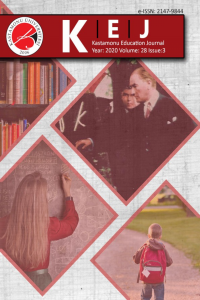Öz
Recent policy and reform documents have promoted inquiry-based learning, which is seen as an effective way of teaching science. However, there are few studies evaluating the teacher-student interactional structure of inquiry-based science (IBS) classes. Although the class is a social plane, where learners are in the process of social interaction as a co-construction process, this lack of research limits our understanding of the nature of interaction in IBS classes. The lack of understanding of this interactive structure causes teachers to provide the desired answers to the theoretical questions that are asked outside the classroom, but the results in the classroom are not at the desired level. On this basis, this study examines IBS classroom interaction by the micro-analytic conversation analysis (CA) method to reveal the interactional phenomena within the classroom. The study was conducted with two science teachers and their 56 fifth-grade students. A database of 12 hours of IBS interactions was examined line-by-line and turn-by-turn using CA. Findings show that there are interactionally different phases in the practice of IBS classes and that teacher-student interactions also change according to context. These stages were named (1) initiating the inquiry, (2) focusing on the investigation, and (3) sharing understanding. Within these different phases of a science lesson, the pedagogical aims of the teachers and the interactive tools are found to differ. This has important implications for the study of the subjects and the class, which are dealt with in depth in terms of science education under a different conceptual framework. In addition, this study presents a contribution to CA research in terms of examining the interactional characteristics of science classes.
Anahtar Kelimeler
conversation analysis classroom interaction language of science inquiry-based science education
Kaynakça
- Abd-El-Khalick, F., Boujaoude S., Duschl, R., Lederman, G. N., Mamlok-Naaman, R., Niaz, M., Treagust, D., et. al. (2004). Inquiry in science education: international perspectives. Science Education, 88(3), 397-419.
- Abrahams, I., & Millar, R. (2008). Does practical work really work? A study of the effectiveness of practical work as a teaching and learning method in school science. International Journal of Science Education, 30(14), 1945-1969.
- Bernstein, B. (1999). Vertical and horizontal discourse: an essay. British Journal of Sociology of Education, 20(2), 157-173.
- Brandt, A. (2011). The maintenance of mutual understanding in online second language talk (Doctoral dissertation, Newcastle University).
Öz
Recent policy and reform documents have promoted inquiry-based learning, which is seen as an effective way of teaching science. However, there are few studies evaluating the teacher-student interactional structure of inquiry-based science (IBS) classes. Although the class is a social plane, where learners are in the process of social interaction as a co-construction process, this lack of research limits our understanding of the nature of interaction in IBS classes. The lack of understanding of this interactive structure causes teachers to provide the desired answers to the theoretical questions that are asked outside the classroom, but the results in the classroom are not at the desired level. On this basis, this study examines IBS classroom interaction by the micro-analytic conversation analysis (CA) method to reveal the interactional phenomena within the classroom. The study was conducted with two science teachers and their 56 fifth-grade students. A database of 12 hours of IBS interactions was examined line-by-line and turn-by-turn using CA. Findings show that there are interactionally different phases in the practice of IBS classes and that teacher-student interactions also change according to context. These stages were named (1) initiating the inquiry, (2) focusing on the investigation, and (3) sharing understanding. Within these different phases of a science lesson, the pedagogical aims of the teachers and the interactive tools are found to differ. This has important implications for the study of the subjects and the class, which are dealt with in depth in terms of science education under a different conceptual framework. In addition, this study presents a contribution to CA research in terms of examining the interactional characteristics of science classes.
Anahtar Kelimeler
Conversation analysis classroom interaction inquiry-based science education language of science
Teşekkür
Doktora tez çalışmasından üretilmiş bir yayındır.
Kaynakça
- Abd-El-Khalick, F., Boujaoude S., Duschl, R., Lederman, G. N., Mamlok-Naaman, R., Niaz, M., Treagust, D., et. al. (2004). Inquiry in science education: international perspectives. Science Education, 88(3), 397-419.
- Abrahams, I., & Millar, R. (2008). Does practical work really work? A study of the effectiveness of practical work as a teaching and learning method in school science. International Journal of Science Education, 30(14), 1945-1969.
- Bernstein, B. (1999). Vertical and horizontal discourse: an essay. British Journal of Sociology of Education, 20(2), 157-173.
- Brandt, A. (2011). The maintenance of mutual understanding in online second language talk (Doctoral dissertation, Newcastle University).
Ayrıntılar
| Birincil Dil | İngilizce |
|---|---|
| Konular | Eğitim Üzerine Çalışmalar |
| Bölüm | Research Article |
| Yazarlar | |
| Yayımlanma Tarihi | 1 Eylül 2021 |
| Kabul Tarihi | 7 Ağustos 2021 |
| Yayımlandığı Sayı | Yıl 2021 Cilt: 29 Sayı: 3 |

